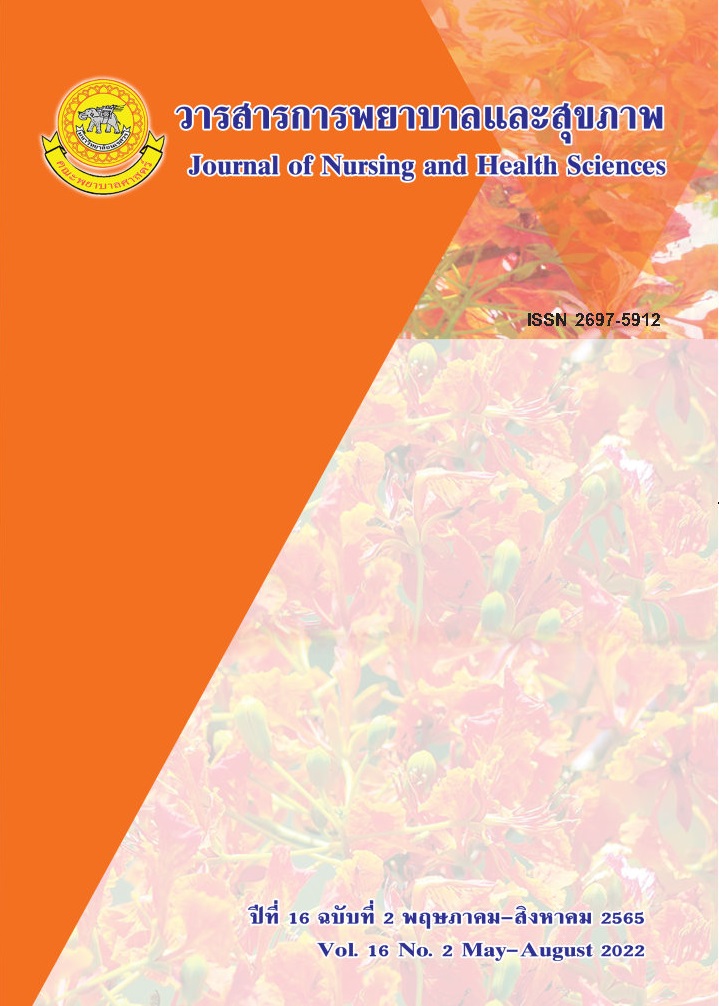ผลของโปรแกรมสร้างเสริมความสามารถแห่งตนเพื่อการจัดการภาวะโภชนาการต่อพฤติกรรมการบริโภคอาหาร และดัชนีมวลกาย ของนักเรียน ชั้นมัธยมศึกษาปีที่ 5 ที่มีภาวะน้ำหนักเกิน
Main Article Content
บทคัดย่อ
การวิจัยกึ่งทดลอง มีวัตถุประสงค์เพื่อศึกษาผลของโปรแกรมสร้างเสริมความสามารถแห่งตนเพื่อการจัดการภาวะโภชนาการต่อพฤติกรรมการบริโภคอาหาร และค่าดัชนีมวลกายของนักเรียนชั้นมัธยมศึกษาปีที่ 5 ที่มีภาวะน้ำหนักเกิน กลุ่มตัวอย่างที่ศึกษาเป็นนักเรียนชั้นมัธยมศึกษาปีที่ 5 ปีการศึกษา 2563 ที่มีภาวะน้ำหนักเกิน แบ่งเป็นกลุ่มทดลองและกลุ่มควบคุม กลุ่มละ 30 คน เครื่องมือดำเนินการวิจัย คือ โปรแกรมสร้างเสริมความสามารถแห่งตนเพื่อการจัดการภาวะโภชนาการ ระยะเวลาในการทดลอง 12 สัปดาห์ ซึ่งประกอบด้วย การส่งเสริมความสามารถในการลดน้ำหนักผ่านประสบการณ์ความสำเร็จ การเรียนรู้ประสบการณ์ลดน้ำหนัก การชักจูงด้วยคำพูดและภาพ ผ่านสื่อออนไลน์ และการจัดการภาวะอารมณ์ เครื่องมือเก็บรวบรวมข้อมูลได้แก่ แบบสอบถามพฤติกรรมการบริโภคอาหาร และแบบบันทึกค่าดัชนีมวลกาย ได้รับการตรวจเชิงเนื้อหา จากผู้ทรงคุณวุฒิ จำนวน 5 ท่าน โดยแบบสอบถามพฤติกรรมการบริโภคอาหาร นำมาหาค่าดัชนีความตรงตามเนื้อหาได้เท่ากับ 0.87 และตรวจสอบความเที่ยงได้ค่าสัมประสิทธิ์อัลฟาของครอนบาคเท่ากับ 0.85 วิเคราะห์ความแตกต่างของค่าเฉลี่ยคะแนนพฤติกรรมการบริโภคอาหารและค่าดัชนีมวลกายก่อนและหลังการทดลองของกลุ่มทดลอง โดยใช้สถิติ Paired t-test และวิเคราะห์ความแตกต่างของค่าเฉลี่ยคะแนนพฤติกรรมการบริโภคอาหารและค่าดัชนีมวลกายหลังการทดลอง ระหว่างกลุ่มทดลองและกลุ่มควบคุม โดยใช้สถิติ Independent t-test ผลการวิจัย พบว่า 1. ภายหลังได้รับโปรแกรมส่งเสริมความสามารถแห่งตนเพื่อการจัดการภาวะโภชนาการ กลุ่มทดลองมีค่าเฉลี่ยคะแนนพฤติกรรมการบริโภคอาหารสูงกว่าก่อนทดลอง อย่างมีนัยสำคัญทางสถิตที่ระดับ (p<.001) 2. ภายหลังได้รับโปรแกรมส่งเสริมความสามารถของตนเอง กลุ่มทดลองมีค่าเฉลี่ยดัชนีมวลกายลดลงกว่าก่อนทดลอง อย่างมีนัยสำคัญทางสถิติที่ระดับ (p<0.001) 3. ภายหลังได้รับโปรแกรมส่งเสริมความสามารถแห่งตนเพื่อการจัดการภาวะโภชนาการ ค่าเฉลี่ยพฤติกรรมการบริโภคอาหารของกลุ่มทดลองสูงกว่ากลุ่มควบคุม อย่างมีนัยสำคัญทางสถิติที่ระดับ (p<.001) และค่าเฉลี่ยดัชนีมวลกายของกลุ่มทดลองต่ำกว่ากลุ่มควบคุมอย่างมีนัยสำคัญทางสถิติที่ระดับ (p<.001) จากผลการวิจัย แสดงให้เห็นว่า โปรแกรมส่งเสริมความสามารถแห่งตนเพื่อการจัดการภาวะโภชนาการมีผลทำให้นักเรียนชั้นมัธยมศึกษาปีที่ 5 ที่มีภาวะน้ำหนักเกินมีพฤติกรรมการบริโภคอาหารดีขึ้น และค่าดัชนีมวลกายลดลง
Article Details

อนุญาตภายใต้เงื่อนไข Creative Commons Attribution-NonCommercial-NoDerivatives 4.0 International License.
เอกสารอ้างอิง
Bandura, A. (1997). Self-efficacy the exercise of control.
New York: W.H. Freeman.
Bandura, A. (1986). Social foundations of thought and
action. Englewood Cliffs, NJ: Prentice-Hall.
Bureau of Nutrition. (2014). Guidelines for controlling
obesity in schoolchildren. Nonthaburi: Department
of health. [in Thai].
Chitaphankul, S. (2001). The main principles of geriatric
medicine (3rd ed.). Bangkok: Chulalongkorn
University. [in Thai].
Chomngam, P., Chaichuay, P., Kaenbubpha, N., &
Thimviang, B., (2018). Effects of health behavior
modification program on health behaviors, body
mass index, and waist circumference of students
Sirindhorn College of Public Health Ubon
Ratchathani with overweight, Nursing, Health,
and Education Journal, 1(3), 43-53. [in Thai].
Cohen, J. (1992). Quantitative methods in psychology.
New York: New York University.
Eamsupasit, S. (2010). Theories and Techniques in
Behavior Modification (7th ed.). Bangkok:
Chulalongkorn University. [in Thai].
Health Data Center. (2020). Percented of teenagers
age 15-18 years well-proportion. Retrieved 26
October 2020, From https://hdcservice.moph.go.
th/hdc/reports/ report.php?source=pformated/
format1.php&cat_id=46522b5bd1e06d24a5bd
a93c&id=9b 019d9cc12576000e6e84
acfb9ad7f0. [in Thai].
Mansiri, R., Oba, N., & Naewbood, S. (2015). Effects
of self-efficacy program on weight control
behaviors and body mass index of obese students.
Journal of Nursing and Health Sciences, 10(3),
-158. [in Thai]
Rattanachueak, S. (2015). Pediatric nutrition handbook
(4th edition). Bangkok: Children's nutrition club
of Thailand, Royal college of pediatricians of
Thailand. [in Thai].
Robert, O.S. (2000). The role of physical Activity in
the Prevention and Treatment of childhood
obesity. Pediatric Nursing, 26(1), 33-41.
Rungrojwattana, W., Kompayak, J., & Punthasee, P.
(2019). Effects of self-efficacy program with
family support on overnutrition in middle school
students. Royal Thai Army Nursing Journal, 20(1).
-284. [in Thai].
Sanprik, S. (2017). The effects of health education
program applying self-efficacy theory towards
weight control among grade 6 students at
Kajonkietsuksa school, Phuket province.
Community Health Development Quarterly Khon
Kaen University, 5(2), 297-314. [in Thai].
Sukanon, A., Rattanagreethakul, S., & Krungkraipetch,
N. (2016). The effects of perceived self-efficacy
promoting program on weight control behaviors
among overweight children in Municipality
Meaung Lopburi, Lopburi province. Journal of
Public Health Nursing, 30(3), 26-40. [in Thai].
Thai Health Promotion Foundation. (2020). Overweight
and obesity. Retrieved 19 October 2020, from
http://www.thaihealth.or.th/Books/782/รายงาน
ประจำป+2564+ สำนกงานกองท ั นสน ุ บสน ั นการ ุ
สรางเสร มส ิ ขภาพ ุ +%28สสส.%.html. [in Thai].
The Secondary Educational Service Area Office Nakhon
Sawan. (2020). Student nutrition information
report. Nakhon Sawan: Factsheet. [in Thai].
Tornee, S., Tapchaisri, C., & Videch, S. (2012).
The effects of health education program applying
self-efficacy theory towards weight control
behavior of overweight students, Journal of
Faculty of Physical Education, 15(Suppl.),
-328. [in Thai].


